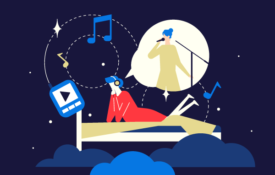-

Listening to Music Near Bedtime Could Lure Sleep-Disrupting ‘Earworms’
Earworms can sometimes interject themselves into our dreams, where they can negatively impact our quality of sleep.
-

Video: Celebrating LGBTQ+ Pride Month with Psychological Science
Psychological science can help pave the way to greater acceptance for members of the LGBTQ+ community.
-

Midnight Attack of the Earworms! How Stuck Songs Sap Sleep
Michael Scullin from Baylor University talks to us about his research examining this phenomenon of sleep-disturbing earworms and how popular tunes can impact our sleep.
-

National Science Foundation Opportunity: Predictive Intelligence for Pandemic Prevention
This initiative focuses on research and capabilities needed to tackle challenges in infectious disease pandemics through prediction and prevention.
-
Hug (Just a Little) Longer!
We’ve all missed connection — especially hugs. Today, try hugging someone a little bit longer than you normally would. When you’re ready to stop the hug, remind yourself to stay close for just five more seconds. Stay present, and tune in to all your senses as you enjoy the embrace. Why Am I Doing This? During the pandemic, we were cautious about hugging friends, strangers and even family members who didn’t live with us. But now, as more people get vaccinated, you can start to hug again. There is a surprisingly large body of science devoted to the health benefits of hugs. The broad conclusion is that hugs are good for you.
-
Burnout: Modern Affliction or Human Condition?
Burnout is generally said to date to 1973; at least, that’s around when it got its name. By the nineteen-eighties, everyone was burned out. In 1990, when the Princeton scholar Robert Fagles published a new English translation of the Iliad, he had Achilles tell Agamemnon that he doesn’t want people to think he’s “a worthless, burnt-out coward.” This expression, needless to say, was not in Homer’s original Greek.


